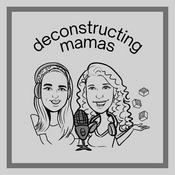After eight seasons, countless conversations, and a whole lot of laughter, tears, unraveling, and becoming, we are releasing our final episode of the Deconstructing Mamas podcast.
This one is different.
Instead of one long conversation, we’re weaving together short, meaningful snippets from every season — tiny heartbeats that capture the essence of what this journey has been for us and for so many of you. Between each season, we share small reflections about what we’ve learned and who we’re becoming.
We hope this episode feels like a quilt of our time together — stitched with honesty, courage, tenderness, and yes… plenty of grace and space.
✨ In This Episode
A curated montage of moments from every season
Personal reflections from Esther and Lizz
A look back at where we started — when very few voices were speaking openly about deconstruction, doubt, or evolving faith
A vision for where we’re headed next
A huge dose of gratitude for YOU — our listeners, our guests, our community
✨ Our Ongoing Work
Although the podcast is ending, our work continues — just in new forms.
Esther is pouring more deeply into her spiritual direction practice, Heard and Held, where she companions people through life transitions, soul questions, and evolving faith.
Learn more: estherjoygoetz.com/heardandheld
Lizz will be tending the Deconstructing Mamas social media space for a while, giving herself room to explore what’s next in her own unfolding faith journey.
✨ A Growing Resource Hub
When we began this podcast, there were almost no resources for people navigating faith shifts — no guides, no shared stories, no roadmap.
Now?
There is a flourishing community of voices doing beautiful, necessary work in the world of evolving faith.
We are committed to pointing you toward them.
Visit our Resource Page, which includes:
Every guest from all eight seasons
Books, podcasts, workshops, and guides that have shaped us
Other teachers, writers, therapists, and spiritual companions who are doing deep, meaningful work
🌱 This page will be fully updated before the end of the year.
Explore here: deconstructingmamas.com/resources
✨ Thank You
To every guest, listener, supporter, question-asker, and quiet companion on the other side of the headphones:
You have given us grace.
You have given us space.
And you have walked with us on this beautiful, hard, sacred, and brave journey of an ever-evolving faith.
We’re forever grateful.



